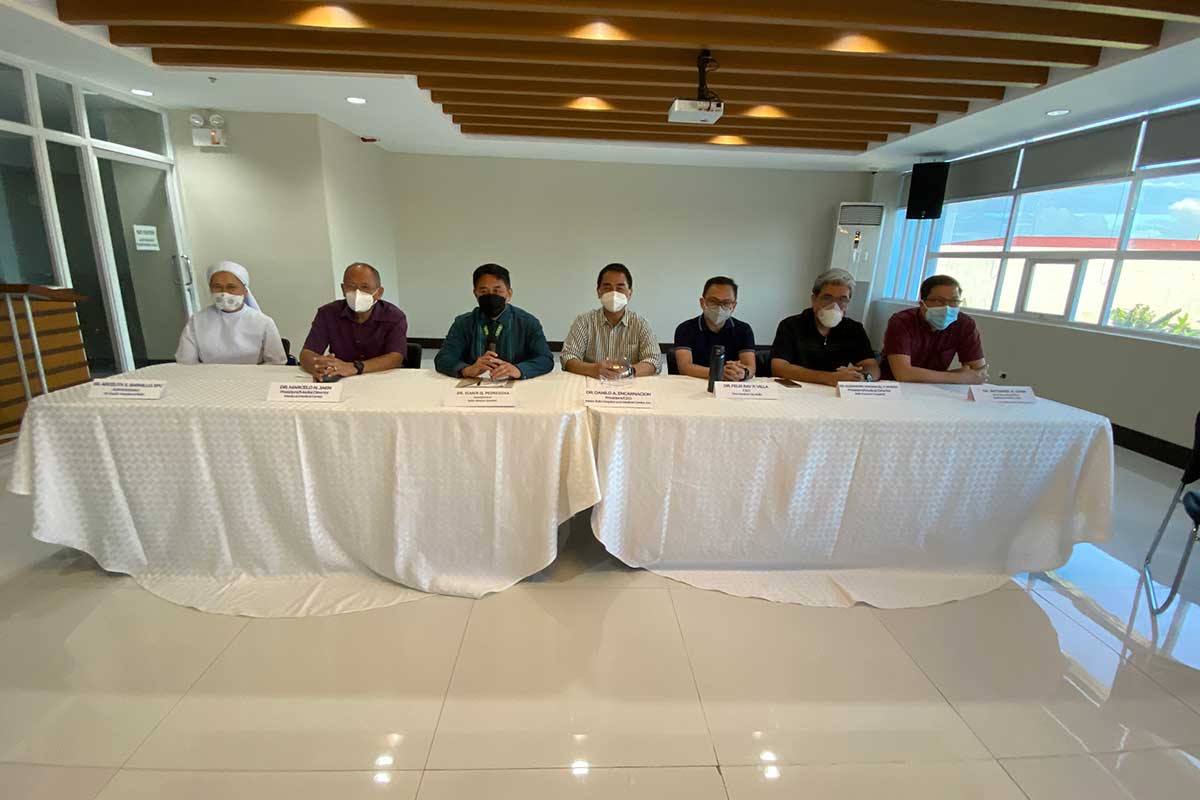
By Joseph B.A. Marzan
The seven Iloilo City hospitals which previously announced their non-renewal of their accreditation with the Philippine Health Insurance Corporation (PhilHealth) last week, said Monday that some of the P545 million in unpaid claims include those dating back as early as 2002.
Representatives from the St. Paul’s Hospital Iloilo (SPHI), Medicus Medical Center (MMC), Iloilo Mission Hospital (IMH), Metro Iloilo Hospital and Medical Center, Inc. (MIHMC), The Medical City Iloilo (TMI), Iloilo Doctor’s Hospital (IDH), and QualiMed Hospital Iloilo (QMHI) gathered at a press conference in Mandurriao district on Monday to elaborate their side.
QMHI Chief Operating Officer Dr. Nathaniel Chan explained that the P545 million that the state-run insurance company owed the hospitals included good claims, claims that were in process, and claims returned to hospital, and denied claims which were re-filed.
IMH Administrator Elmer Pedregosa explained that they gave PhilHealth initially until Oct 31, 2021 to settle the accountabilities, but they got wind of another meeting with other Manila-based hospitals with the same predicament.
Pedregosa mentioned that PhilHealth met with St. Luke’s Medical Center, The Medical City, and Mount Grace Hospitals, which were also owed between P1 billion to P3 billion in claims.
Pedregosa emphasized that almost 50 percent of the unpaid claims were from coronavirus disease 2019 (COVID-19) patients, and that the older hospitals such as IMH, IDH, and SPHI have bigger unpaid claims.
“We gave them a deadline of October 31. Time came, and we advised their counsel of the payment we had received which totaled to 15 to 20 percent of the total accounts receivable, on average. This falls short of what we were expecting. We thought that we would get around 70 or 80 percent but it never happened. That was the deadline that we gave,” Pedregosa explained.
Pedregosa added that they also observed that while their clamor for the claims were getting louder, the PhilHealth’s processes were getting more complicated.
“We noticed here in Iloilo that it seems like their [PhilHealth’s] commitment was not going somewhere. Instead of getting more, we noticed we were getting less. We also noticed that the processes were getting much slower and [processed claims] were getting fewer,” he added.
The hospitals made a common point that they could no longer tolerate the undue delays by the PhilHealth in processing claims as it had already made an impact on their operations.
MIHMC President and CEO Dr. Danilo Encarnacion shared that they still had existing loans to pay which could have been settled using the PhilHealth claims.
IMC Chief Medical Officer Dr. Felix Ray Villa shared his fear that the longer existence of the unpaid claims may lead to them laying off personnel.
“It’s difficult for us to pay our suppliers, it’s difficult for us to pay our loans, and if that happens, we will have to lay off people, and that’s not something that we all want because if we’re talking about the good for the Filipino people, we also have to remember that people who work in a hospital are also Filipinos,” Villa said.
IDH President and Medical Director Dr. Alejandro Rivera also explained that there was a public misconception of hospitals being “rich” due to high charges.
“So many losses is bad for any establishment. We are counting on PhilHealth to pay because that’s a package. That’s a loss already. People think hospitals are filthy rich because we charge a lot, but medical care costs a lot. We don’t get any subsidies for electricity and water. We also need to upgrade our equipment. How are we supposed to acquire new or [fix] broken equipment?” Rivera said.
In discussing how the unpaid claims have affected and are still affecting their operations, SPHI Administrator Sr. Aracelita Sornillo mentioned that claims had been stagnant since 2002.
“[The other hospitals] have mentioned that their receivables date as early as 2013, but in the case of [SPHI], ours is way back 2002. So you can just imagine. [SPHI] is a training hospital, so we have more staff, and because of the [COVID] pandemic also, hospitals that have patients have gone down. We have to keep our employees despite our losses,” Sornillo said.
As to their hospital’s statuses, Encarnacion said that they had been assured by the Department of Health (DOH) that their hospital permits and accreditations would remain untouched despite their exit from the state-run provider.
But MMC Hospital Director Dr. Marcelo Jaen also assured the public that all of the hospitals will still accept PhilHealth members, but the burden of processing and following up claims would be up to the patients’ families themselves.
Villa also stated that they would also process the PhilHealth claims of their employees, and the hospitals also state that they will still deduct benefits from employees’ salaries according to law.
“Our accreditation and license to operate is entirely due to the DOH. PhilHealth has nothing to do with that. [The DOH] told us that they had nothing to do as far as the PhilHealth is concerned regarding our licenses to operate,” said Encarnacion.
But Pedregosa also mentioned that the hospitals will be meeting with PhilHealth officials from Manila, which Pedregosa said was “surprising” to them.
“I think it’s a great move on their part, because for the first time, they will be coming down from Manila, and we’re not on a Zoom meeting anymore. We welcome the move, and as Ilonggos that we are, we want to uphold their request. Hopefully we will have good results,” Pedregosa said.
If there was any hope of them scrapping their intention to nix PhilHealth renewal by Jan 1, 2021, they said that they may accede depending on any agreements that may be made.
Daily Guardian is still trying to get PhilHealth’s comment.
















